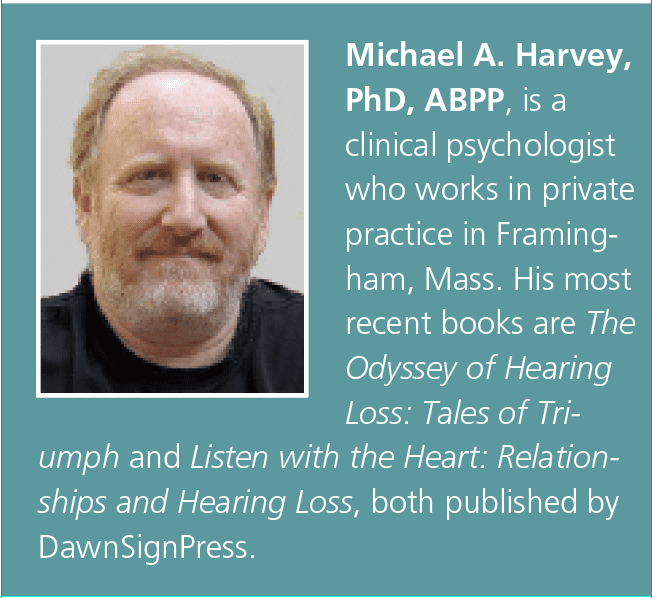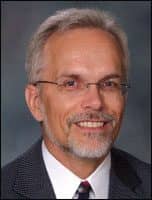Patient Care | February 2021 Hearing Review
How hope, persistence, and hard work–along with empathy–can help people fighting tinnitus
I often quip that I know how it feels to give birth because I saw my wife do it twice. The point is you can’t truly empathize with someone who is going through such an extremely difficult and painful ordeal. However, I feel inspired by the tenacity and courage exhibited by my patients who suffer from tinnitus. As a professional, it is important to realize we play an important role in providing empathy, hope, and support in bolstering their optimism, persistence, and hard work in trying times.
By Michael A. Harvey, PhD, ABPP
I recall initially meeting a patient with terminal cancer who informed me that she had a month or so to live. What the hell am I supposed to do? I privately lamented. Sue’s request was for me to teach her imagery strategies that would attack her cancer cells—a version of the then-popular Nintendo game when one plays as Mario and saves Princess Peach by attacking the evil Bowser. Although her physician had informed her of the medical indefensibility of this approach, she wouldn’t hear of it. After some hesitation, I reluctantly acquiesced to her request, and for three visits, we marveled at how her internalized images of Mario had effortlessly obliterated her evil Bowser cancer cells. But she died a week later.
I often think of Sue when consulting with hearing care professionals (HCPs) who lament about being unable to cure patients of tinnitus. Of course, my associating these two disorders is, in many ways, woefully flawed because tinnitus isn’t terminal. In fact, Mazevski et al1 emphasized that “The good news—and it is very good news —is that for perhaps up to 90% of tinnitus sufferers, hearing care professionals (HCPs) can help provide tinnitus management” [italics added]. However, often this assurance isn’t anywhere near good enough news for patients who fervently seek a cure.
As an example, Mary awoke one morning with relentless “clanging” in her head. For several long tortuous days, she gritted her teeth before finally meeting with specialists from neurology, otolaryngology, psychiatry, audiology, acupuncture, and therapeutic massage. After the first round of futile visits, her husband sought out more of “the best” doctors. There had to be some way to make the noise go away. Her life morphed from being a happy devoted wife/mother/grandmother to feeling like she was a burden on everyone. The noise got so unbearable that she had recurring panic attacks which warranted an ER evaluation where she blurted out, “My family would be better off without me.”
Consequently, she was immediately sectioned at a psychiatric in-patient unit where after several long hours, the team finally concluded that she was not suicidal. She has been on a slew of medications, some of which help her to relax but none eliminates the head noise. Mary remains petrified that tinnitus is taking over her life.
I inquired about her recent visit to a prominent audiology practice that her husband had found. Immediately, she teared up and responded that for several days after that visit, she couldn’t stop crying. “It wasn’t because Dr Smith didn’t have a cure,” she emphasized, “but it was because of how he behaved.”
I asked Mary to write a letter to that doctor that she may never send. This is a common ritual to help adults recover from trauma.2
Dear Dr Smith,
I want to let you know how I felt about our appointment and how I felt when I left your office. As I’m sure you know, your tinnitus patients are probably the most vulnerable people you see. We come into your office knowing there’s very little you’re going to be able to do for us but we have the slight glimmer of hope that you will find something—anything! The fact that you made little to no eye contact with me made me realize early on that our meeting would be quick and there would be no answers. I felt like I was a nuisance, and you would just go through the steps and dismiss me.
When I got emotional, it didn’t seem to faze you and I sensed it made you speed up the appointment to get rid of me quicker. When I asked questions, your answers were very blunt, stoic, and unfiltered with little to no compassion. And because of COVID, I had to be there alone, so gathering myself together and getting out of your office in one piece was even more difficult without a family member or anyone there for support. I’m sure that never even crossed your mind. Honestly, it took me a couple of days to get that appointment out of my head.
Obviously, you should know that tinnitus is a difficult diagnosis to bear, but I guess if you haven’t suffered it yourself you can’t relate.
An articulate letter straight from her soul. She minced no words. It was Maya Angelou who said, “I’ve learned that people will forget what you said, people will forget what you did, but people will never forget how you made them feel.” She was half right. In this case, Mary remembered each and every word Dr Smith uttered, including how he made her feel. Every detail of the visit was seared into her mind.
I repeatedly told Mary how sorry I was that she had this experience, particularly since she had held on to a glimmer of hope that “the best” doctor would have the answer. She was prepared for that disappointment, however, but not for feeling dismissed and “slapped in the face.” After taking care to validate that her anger was justified and assuring her that I was in no way excusing Dr Smith’s demeanor, I said that I could easily imagine what he may have been feeling; that, in fact, I empathize with him. I shared my “What the hell am I supposed to do?” experience with Sue, the woman with cancer.
Dr Smith isn’t the boogie man. It’s supposed to go like this: if we render the proper diagnosis and prescribe the proper treatment, we will have a successful outcome. A done deal. However, when that medical model algorithm falters, there is an inevitable cost of caring.
Although we may not be able to empathically relate to tinnitus sufferers, we aren’t immune to internalizing their pain. All too insidiously, we become weighted down by an accumulation of protective armor that erodes our compassion for patients who are desperately seeking our help. Figley3 aptly coined this cost of caring as compassion fatigue. In the words of Czech author, Milan Kundera, “There is nothing heavier than compassion. Not even one’s own pain weighs so heavy as a pain with someone and for someone, a pain intensified by the imagination and prolonged by a hundred echoes.”
Mary and I discussed Dr Smith’s and my compassion fatigue for a bit. Then I gave her some more homework: to imagine how Dr Smith could have responded to her letter; how he could have comforted her even though he had no magic pill:
Dear Mary,
Thank you very much for your heartfelt note that I’m sure was very difficult to write. I’m so sorry for my lack of bedside manner with you in my office. I didn’t mean any disrespect, and you’re right: I have never had tinnitus so I can’t know exactly how you feel. But over many decades of practice, I’ve heard countless patients tell me, as you aptly put it, what a difficult diagnosis it is to bear. I’m not making excuses but frankly, after a while, it gets to me. I became a doctor to help people, and with tinnitus sufferers, my ability to help doesn’t feel adequate. To put it bluntly, it feels shitty. And with you, and unfortunately with some other patients, I’ve often found myself just going through the motions.
Mary, your letter jarred me out of that numbness of helplessness and woke me up to a realization that I have underrated the benefits of compassion. So let me now reach out to you and see if there’s anything else that I can possibly do for you. I can appreciate how disappointing it is to hear that you have a condition that medicine cannot help, but I want you to know that I am here for you. If there are any other professional services you may need, please reach out to me to see if I can connect you with the right people. Of course, I will keep you informed if any new treatments become available.
Mary quickly bounced back after her appointment with Dr Smith. With her doctors, she dedicated herself to leaving no potentially curative stone unturned, and with me, she learned backup strategies for ultimately managing what she may not be able to change. Our work together included Cognitive Behavioral Therapy (CBT) and Acceptance and Commitment Therapy (ACT)—established evidenced-based psychotherapeutic approaches of managing tinnitus.4,5 CBT teaches us that the way we think about things affects how we feel and then how we behave. As examples, Mary could modify her thought that an onset of tinnitus ipso facto will ruin her entire day (all/nothing thinking), and that tinnitus was due to divine punishment for a transgression.
She could choose other plausible explanatory narratives. And ACT helped Mary use mindfulness and distraction strategies that would enable her to enjoy cherished activities, such as a boat ride or an evening out with her husband.6-8
During our sessions, I often make references to her embarking on a personal journey which, in psychological vernacular, incorporates an essential dialectic. This is a mouthful and warrants clarification. In this context, the term “dialectic” means a synthesis or integration of opposites: leaving no stone (aka, tinnitus treatment) unturned while simultaneously resigning herself to a chronic disorder.
On the one hand, Mary and her family assiduously continue to research traditional and alternative remedies (eg, Tinnitus Retraining Therapy, auditory masking, medication, herbology, and dietary supplements). She exercises what sociologists call personal agency, a version of the American folktale, involving the little train that could make it up the hill—“I think I can, I think I can” —that is used to teach children the value of optimism, persistence, and hard work. However, on the other hand, as Mary acknowledged in her imaginary letter to Dr Smith, “We come into your office knowing there’s very little you’re going to be able to do for us.” This part of the dialectic ushers in her grieving that no matter how hard she tries, she may never be able to make it up the hill, to rid herself of the noises in her head.
Within reason, I continue to encourage her to investigate remedies that do not have significant financial or health risks, even those that are not evidence-based. Admittedly, this approach may render her vulnerable to scams and impede her coming to terms with not curing tinnitus. However, how many unturned stones are enough? One cannot absolutely guarantee to a patient that a particular remedy won’t work for them, as evidenced by the plethora of anecdotal success stories (and a placebo effect, in some cases, still offers a glimmer of empowerment against tinnitus, even if it’s temporary). I predicted to her that at some point, she will intuit that “enough is enough.” To reiterate, this is the dialectic: balancing personal agency (I can) verses grieving (I can’t). Of course, this is easier said than done.
I began one session by telling Mary I was proud of her. I didn’t mean to sound paternalistic, but what suddenly struck me was that for over two months, she had endured my numerous versions of “Just ignore the intruder in your body.” Sometimes in the early evenings, she cannot take it anymore and takes a sleeping pill only to renew her struggle the next day. Like Dr Smith, I cannot empathically relate to Mary as I don’t suffer from tinnitus. (I often quip that I know how it feels to give birth because I saw my wife do it twice.) However, I feel inspired by her tenacity along her tortuous journey that began out of nowhere upon awakening from a peaceful sleep.
I am not only proud of her, but she has given me an intimate glimpse of human resilience and increased respect for the human spirit. As healthcare practitioners, we can benefit in this manner from our patients if we are open to it. Note that in Mary’s fantasied correspondence with Dr Smith, he validates her suffering and assures her of continued care, and she facilitates his lowering his protective shield of compassion fatigue. A win-win outcome.
Given this experience with Mary and the success with our correspondence exercise, it was past time that I write a thank-you letter to Sue:
Dear Sue,
I remember you as if it were yesterday even though it has been several years. You were a really likable, brave woman. And this is what made it hard for me. I had never worked with someone who was about to die. Bearing witness to your futile struggle made me feel sad, helpless, and hopeless. And to make matters worse—and I’m more than a bit embarrassed to admit this—I didn’t look forward to our meetings. I’m so sorry! And at times, I was even annoyed that you were wasting my time because, unlike you, I didn’t have any faith in Mario to obliterate metastatic carcinoma. And sure enough, one day when you didn’t show up for your appointment, I called your home and your husband told me you had “passed.”
However, I need you to know something that’s very important: the bottom line. I remain extremely grateful to have met you. You taught me about resilience and what it really means to help. I sat with you, joined you in doing something—anything—rather than passively succumb to the evil Bowser cancer cells in your body. And you kept saying you felt better even though all I did was listen. Now that I think about it, looking back, I don’t believe you really had a definite expectation that Mario and I would cure you of cancer. I’ll never forget the seemingly casual comment you made when you left my office for the very last time: “Hope is the last thing I’ll ever lose.”

Citation for this article: Harvey MA. How can we help patients with tinnituswhen we don’t have a cure? Hearing Review. 2021;28(2):22-24.
Correspondence can be addressed to HR or Dr Harvey at: [email protected].
References
- Mazevski A, Beck DL, Paxton C. Tinnitus issues and management: 2017. Hearing Review. 2017;24(7):30-36.
- Bass E, Davis L. The courage to heal: A guide for women survivors of child sexual abuse. 1st ed. Harper and Row; 1988.
- Figley CR. Compassion fatigue: Coping with secondary traumatic stress disorder in those that treat the traumatized. 1st ed. Routledge;1995.
- Henry JA, Piskosz M, Noreña A, Fournier P. Toward standardization of basic tinnitus services by audiologists. Hearing Review. 2020;27(4):14-18.
- McKenna L, Andersson G. Changing reactions to tinnitus. Hearing Review. 2007;14(9):12-19.
- Harvey MA. I give it its due so I can enjoy the rest of the day: Acceptance and commitment therapy. Hearing Loss. 2019[Jul/Aug]:40(4):26-28.
- Harvey M. What we think can hurt us: Cognitive behavioral therapy and tinnitus. Hearing Loss. 2019[Mar-Apr];40(2):28-30.
- Harvey MA. A psychological tool for managing tinnitus: Creating useful narratives. Hearing Review. 2018;25(3):22-24.






This was a very thoughtful and helpful article, Michael. Thank you for making the world a better place by sharing your comments.